|
Printables |
PowerPoints |
Online exercises |
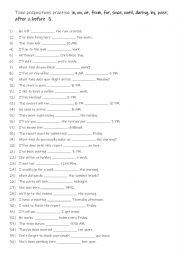
|
A1+-A2 Time prepositions practise in, on, at, from, for, since, until, during, by, past, after & before 3
Learning time prepositions like in, on, at, from, for, since, until, during, by, past, and after is important for students because they are essential for expressing time relationships clearly and accurately. These prepositions help students talk about when things happen, how long actions last, and their sequence in time. Mastering them allows stude...
Level: elementary
Age: 8-100
Type: worksheet
Downloads: 122
|
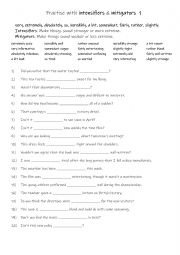
|
B1-B2 Practise with intensifiers & mitigators 1
Students should learn to use intensifiers and mitigators to communicate more precisely, fluently, and naturally. Intensifiers make statements stronger, while mitigators soften them, allowing for nuanced expression of emotions and opinions. Mastering these tools improves writing, speaking, and listening skills, helping students adjust language based...
Level: intermediate
Age: 10-100
Type:
Downloads: 140
|
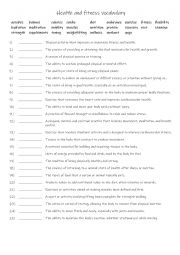
|
A2+-B1+ Health and fitness vocabulary
First, students need to familiarise themselves with the 25 words and their meanings Then they read the definitions to see which one is being described and write that word in the space provided. Answers on page 2.
Level: elementary
Age: 10-100
Type:
Downloads: 122
|

|
A2+-B1 Practise with 12 conditional phrases 4
First, students need to familiarise themselves with the 12 conditional phrases and their meanings and use. Then they read the sentences to see which one is suitable to complete the gap-fill. Each conditional phrase is used 2 times! Answers on page 2.
Level: elementary
Age: 9-100
Type:
Downloads: 131
|
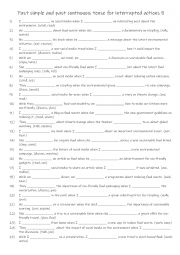
|
A1+-A2 Past simple and past continuous tense for interrupted actions 5
Understanding how to use these tenses together enables students to narrate stories or describe situations more naturally and accurately. First, students need to familiarise themselves with the 2 tenses and their usage. Then they read the sentences to see which one is needed to complete the sentences in a natural way. Answers on page 2
Level: elementary
Age: 8-100
Type: worksheet
Downloads: 106
|
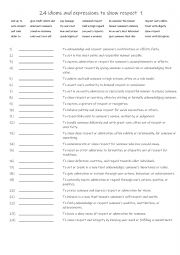
|
B1+-C1 24 idioms and expressions to show respect 1
First, students need to familiarise themselves with the 20 idioms and expressions and their meanings. Then they read the definitions to see which one is being described and write that word in the space provided Answers on page 2.
Level: intermediate
Age: 12-100
Type:
Downloads: 105
|
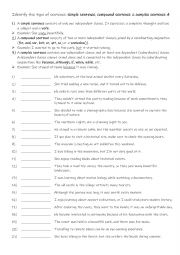
|
A2 Identify the type of sentence simple sentence, compound sentence & complex sentence 4
Students should learn to identify simple, compound, and complex sentences because it helps them write with more variety, organise ideas clearly, understand reading texts more easily, prepare for future learning, and communicate their thoughts more accurately. Each type is used 7 times. Answers on page 2.
Level: elementary
Age: 9-100
Type:
Downloads: 169
|
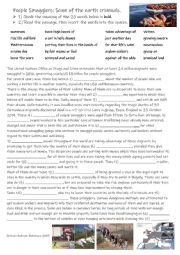
|
People Smugglers. Scum of the earth criminals.
570-Word reading article with a 20-word gap fill exercise about people smuggling. It takes an in-depth look at how people are used by criminals.This sheet is suitable for higher level B1-B2 students of all ages. An answer sheet is included. For higher level students they could be put in groups to give / present their opinions in a presentation.
Level: intermediate
Age: 12-100
Type:
Downloads: 1716
|
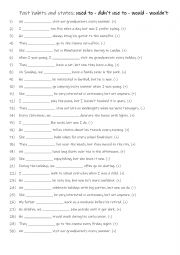
|
B1-B2 Past habits and states - used to - didn�t use to - would - wouldn�t practise
Students complete the sentences with the correct form of the verb using (+) for positive and (-) for negative verb constructions. Obviously, would cannot be used with state verbs, but can and should be used to contrast the past instead of just using used to. A selection of possible answers on page 2.
Level: intermediate
Age: 9-100
Type: worksheet
Downloads: 118
|
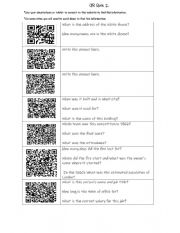
|
QR Quiz 2
Students use either a smartphone or tablet to search for the required information at the directed website.
* iphones can use their camera to read each QR image.
* If a student doesn�t have a QR already installed, they can download a QR such as Neo for free on the internet.
* Wifi is required for most of the questions.
Level: intermediate
Age: 12-100
Type: worksheet
Downloads: 179
|
|
|
|
|












